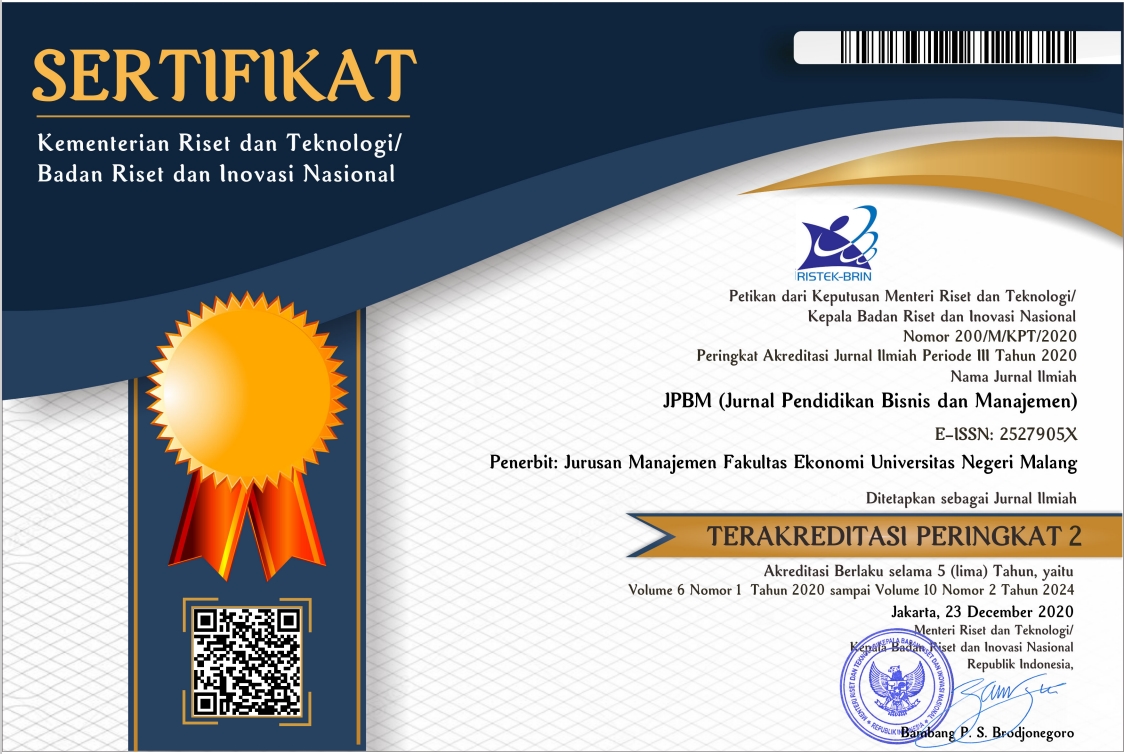Digitalization Capability and Organizational Performance: The Mediating Role of Organizational Agility
Abstract
Digitalization is prominent for companies and businesses, especially in the era of modern information technology. Digitalization can increase efficiency in business processes, including manufacturing, supply chains, inventory management, and administrative processes. Hence, this study aims at investigating the role of organizational agility in mediating the relationship between digitalization capability and business performance. A purposive sampling was used to gather the data from managers in PT. Mayora Indah Tbk. Furthermore, the data were analyzed using structural equation modeling. The findings indicate that digitalization capability has a significant effect on organizational performance and organizational agility. In addition, this study showed that digitalization capability has an effect on organizational agility. This study also confirms the role of organizational agility in mediating the link between digitalization capability and organizational performance. This study provides implications for the need for organizational agility in supporting digitalization capability and organizational performance.
Keywords: organizational performance, organizational agility, digitalization capability
Full Text:
PDFReferences
Annarelli, A., Battistella, C., Nonino, F., Parida, V., & Pessot, E. (2021). Literature review on digitalization capabilities: Co-citation analysis of antecedents, conceptualization and consequences. Technological Forecasting and Social Change, 166, 120635.
Bagozzi, R. P., & Yi, Y. (1988). On the evaluation of structural equation models. Journal of the Academy of Marketing Science, 16, 74-94.
Bahrami, M. A., Kiani, M. M., Montazeralfaraj, R., Zadeh, H. F., & Zadeh, M. M. (2016). The mediating role of organizational learning in the relationship of organizational intelligence and organizational agility. Osong Public Health and Research Perspectives, 7(3), 190-196.
Belli, L., Davoli, L., Medioli, A., Marchini, P. L., & Ferrari, G. (2019). Toward Industry 4.0 with IoT: Optimizing business processes in an evolving manufacturing factory. Frontiers in ICT, 6, 17.
Bharadwaj, S., Bharadwaj, A., & Bendoly, E. (2007). The performance effects of complementarities between information systems, marketing, manufacturing, and supply chain processes. Information Systems Research, 18(4), 437-453.
Brunetti, F., Matt, D. T., Bonfanti, A., De Longhi, A., Pedrini, G., & Orzes, G. (2020). Digital transformation challenges: strategies emerging from a multi-stakeholder approach. The TQM Journal, 32(4), 697-724.
Butt, J. (2020). A conceptual framework to support digital transformation in manufacturing using an integrated business process management approach. Designs, 4(3), 17.
Caesari, A. S., Iqbal, M., & Hutahayan, B. (2023). The effect of agility on firm performance: Study in Indonesian aviation industry during Covid-19 pandemic. Profit: Jurnal Administrasi Bisnis, 17(2), 203-213.
Cappa, F., Oriani, R., Peruffo, E., & McCarthy, I. (2021). Big data for creating and capturing value in the digitalized environment: unpacking the effects of volume, variety, and veracity on firm performance. Journal of Product Innovation Management, 38(1), 49-67.
Cegarra-Navarro, J. G., Soto-Acosta, P., & Wensley, A. K. (2016). Structured knowledge processes and firm performance: The role of organizational agility. Journal of Business Research, 69(5), 1544-1549.
Fornell, C., & Larcker, D. F. (1981). Evaluating structural equation models with unobservable variables and measurement error. Journal of Marketing Research, 18(1), 39-50.
Foroudi, P., Gupta, S., Sivarajah, U., & Broderick, A. (2018). Investigating the effects of smart technology on customer dynamics and customer experience. Computers in Human Behavior, 80, 271-282.
Gao, J., Ren, L., Yang, Y., Zhang, D., & Li, L. (2022). The impact of artificial intelligence technology stimuli on smart customer experience and the moderating effect of technology readiness. International Journal of Emerging Markets, 17(4), 1123-1142.
Ghasemaghaei, M., & Calic, G. (2020). Assessing the impact of big data on firm innovation performance: Big data is not always better data. Journal of Business Research, 108, 147-162.
Gong, C., & Ribiere, V. (2023). Understanding the role of organizational agility in the context of digital transformation: an integrative literature review. VINE Journal of Information and Knowledge Management Systems.
Guven, H. (2020). Industry 4.0 and marketing 4.0: in perspective of digitalization and E-Commerce. In Agile Business Leadership Methods for Industry 4.0 (pp. 25-46). Emerald Publishing Limited.
Hair Jr, J. F., Matthews, L. M., Matthews, R. L., & Sarstedt, M. (2017). PLS-SEM or CB-SEM: updated guidelines on which method to use. International Journal of Multivariate Data Analysis, 1(2), 107-123.
Hajli, N., Shirazi, F., Tajvidi, M., & Huda, N. (2021). Towards an understanding of privacy management architecture in big data: An experimental research. British Journal of Management, 32(2), 548-565.
Huseynov, R., Aliyeva, N., Bezpalov, V., & Syromyatnikov, D. (2023). Cluster analysis as a tool for improving the performance of agricultural enterprises in the agro-industrial sector. Environment, Development and Sustainability, 1-14.
Li, L., Lin, J., Turel, O., Liu, P., & Luo, X. (2020). The impact of e-commerce capabilities on agricultural firms’ performance gains: the mediating role of organizational agility. Industrial Management & Data Systems, 120(7), 1265-1286.
Lu, Y., & Ramamurthy. (2011). Understanding the link between information technology capability and organizational agility: An empirical examination. MIS quarterly, 931-954.
Machado, C. G., Winroth, M., Carlsson, D., Almström, P., Centerholt, V., & Hallin, M. (2019). Industry 4.0 readiness in manufacturing companies: challenges and enablers towards increased digitalization. Procedia Cirp, 81, 1113-1118.
Mehdibeigi, N., Dehghani, M., & mohammad Yaghoubi, N. (2016). Customer knowledge management and organization’s effectiveness: Explaining the mediator role of organizational agility. Procedia-Social and Behavioral Sciences, 230, 94-103.
Nafei, W. A. (2016). Organizational agility: The key to organizational success. International Journal of Business and Management, 11(5), 296-309.
Nambisan, S., Wright, M., & Feldman, M. (2019). The digital transformation of innovation and entrepreneurship: Progress, challenges and key themes. Research Policy, 48(8), 103773.
Papadopoulos, T., Baltas, K. N., & Balta, M. E. (2020). The use of digital technologies by small and medium enterprises during COVID-19: Implications for theory and practice. International Journal of Information Management, 55, 102192.
Ralston, P., & Blackhurst, J. (2020). Industry 4.0 and resilience in the supply chain: a driver of capability enhancement or capability loss?. International Journal of Production Research, 58(16), 5006-5019.
Ribeiro-Navarrete, S., Botella-Carrubi, D., Palacios-Marqués, D., & Orero-Blat, M. (2021). The effect of digitalization on business performance: An applied study of KIBS. Journal of Business Research, 126, 319-326.
Ritter, T., & Pedersen, C. L. (2020). Digitization capability and the digitalization of business models in business-to-business firms: Past, present, and future. Industrial Marketing Management, 86, 180-190.
Saha, N., Gregar, A., & Sáha, P. (2017). Organizational agility and HRM strategy: Do they really enhance firms’ competitiveness?. International Journal of Organizational Leadership, 6, 323-334.
Schilke, O. (2018). A micro-institutional inquiry into resistance to environmental pressures. Academy of Management Journal, 61(4), 1431-1466.
Schwertner, K. (2017). Digital transformation of business. Trakia Journal of Sciences, 15(1), 388-393.
Sekaran, U., & Bougie, R. (2016). Research methods for business: A skill building approach. John wiley & sons.
Sharma, P., Leung, T. Y., Kingshott, R. P., Davcik, N. S., & Cardinali, S. (2020). Managing uncertainty during a global pandemic: An international business perspective. Journal of Business Research, 116, 188-192.
Spiess, J., T'Joens, Y., Dragnea, R., Spencer, P., & Philippart, L. (2014). Using big data to improve customer experience and business performance. Bell labs Technical Journal, 18(4), 3-17.
Teece, D., Peteraf, M., & Leih, S. (2016). Dynamic capabilities and organizational agility: Risk, uncertainty, and strategy in the innovation economy. California Management Review, 58(4), 13-35.
Tsvok, D., & Toczynska, J. (2018). Digitalization as a tool for providing competitive advantages to enterprises in the machine-building industry. Economics, Entrepreneurship, Management, 5(1), 23-30.
Worley, C. G., & Lawler, E. E. (2010). Agility and organization design: A diagnostic framework. Organizational Dynamics, 39(2), 194-204.
Yang, M., Fu, M., & Zhang, Z. (2021). The adoption of digital technologies in supply chains: Drivers, process and impact. Technological Forecasting and Social Change, 169, 120795.
Zhao, Y., Xu, X., & Wang, M. (2019). Predicting overall customer satisfaction: Big data evidence from hotel online textual reviews. International Journal of Hospitality Management, 76, 111-121.
DOI: http://dx.doi.org/10.17977/um003v9i22023p177
Refbacks
- There are currently no refbacks.
JPBM (Jurnal Pendidikan dan Bisnis Manajemen) is licensed under a Creative Commons Attribution-NonCommercial-ShareAlike 4.0 International License.
JPBM (Jurnal Pendidikan dan Bisnis Manajemen) is abstracted and indexed in :
















